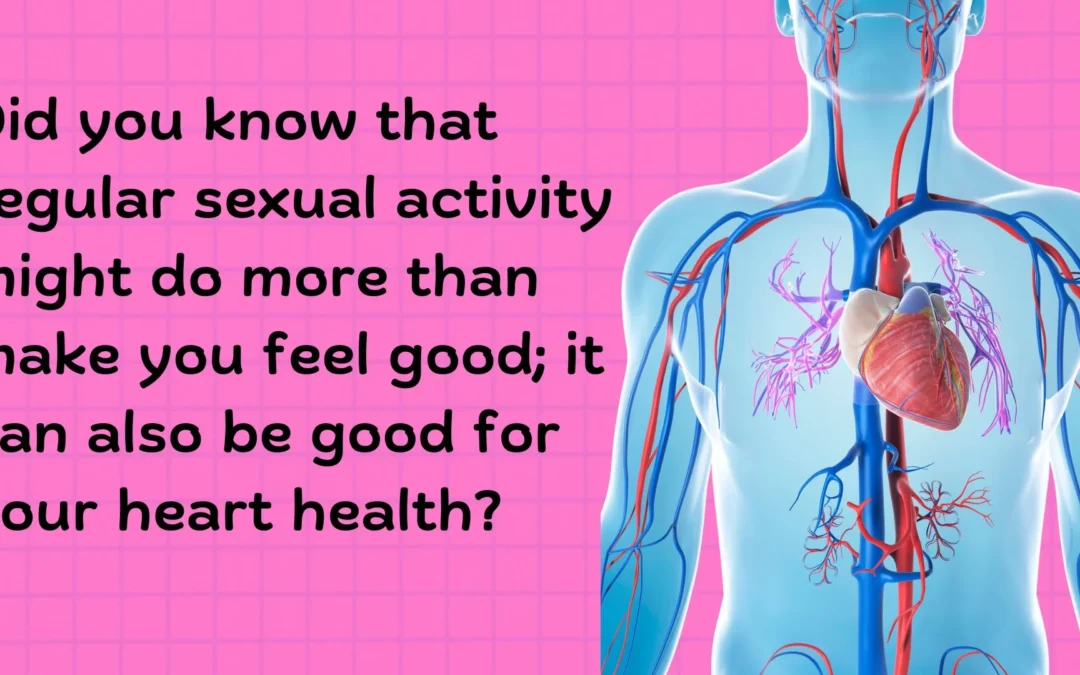Introduction
Did you know that regular sexual activity might do more than make you feel good; it can also be good for your heart health?
Research suggests that intimacy and sexual activity can help improve cardiovascular health, reduce stress, and even extend your lifespan. Whether you’re single or in a relationship, keeping an active sex life can be a natural way to maintain a healthy body and mind.
The Science Behind Sex and Heart Health
When you’re intimate, your heart rate increases, blood circulation improves, and your body releases a rush of feel-good hormones. This physical response is quite similar to light cardio exercise like brisk walking or dancing. Over time, these mini “workouts” can support better blood flow and help keep your cardiovascular system in shape.
Key Cardiovascular Benefits of Regular Sexual Activity
- Improves Blood Circulation
Every sexual encounter increases blood flow throughout the body, including your heart and major arteries. This consistent circulation helps your cardiovascular system function more efficiently and keeps blood vessels flexible.
- Lowers Blood Pressure
Regular intimacy has been linked with lower blood pressure levels. According to studies, people who have sex more often tend to have better control over hypertension, one of the main risk factors for heart disease.
- Reduces Risk of Heart Disease
Maintaining an active sex life can improve your cholesterol profile and lower harmful LDL levels. It may also help reduce inflammation and prevent the buildup of plaque in the arteries — both key for preventing heart attacks or strokes.
- Boosts Oxygen Supply
During sex, your breathing deepens, and oxygen levels in your blood rise. This increased oxygen delivery keeps your heart and organs functioning at their best.
Hormonal and Emotional Effects That Benefit the Heart
Sex triggers the release of powerful hormones like endorphins, oxytocin, and dopamine, all known for reducing stress and boosting mood. Lower stress means lower cortisol levels, which directly reduces strain on your heart. Plus, that emotional connection you feel after sex isn’t just psychological; it’s a natural way to promote mental calm and cardiovascular balance.
Sex as a Form of Exercise
Believe it or not, a single session of sexual activity can burn between 70–150 calories depending on intensity. That’s similar to a light jog or yoga workout! When done regularly, sex helps improve muscle tone, flexibility, and endurance, all of which contribute to a healthier heart.
How a Healthy Sex Life Reflects Overall Health
Sexual health often mirrors overall well-being. For example, erectile dysfunction or low libido can sometimes be early signs of underlying cardiovascular problems. Paying attention to your sexual health can therefore help you spot potential heart issues early and motivate lifestyle improvements like better diet and exercise.
Safe Practices for a Heart-Healthy Sex Life
Keeping your sex life heart-friendly doesn’t require major changes, just a few healthy habits:
- Avoid smoking and excessive drinking.
- Eat heart-friendly foods like fish, nuts, and leafy greens.
- Manage stress with mindfulness or meditation.
- Sleep well and stay active outside the bedroom too.
If you already have heart problems, it’s always wise to consult your doctor before increasing sexual activity levels.
When to Be Cautious
If you experience chest pain, shortness of breath, or fatigue during intimacy, it’s a sign to slow down and get checked. People with heart conditions or high blood pressure should discuss safe limits and medications with their doctor. Remember, the goal is wellness, not risk.
Conclusion
Sex is more than just pleasure; it’s an essential part of holistic health. When practiced safely and regularly, sexual activity can lower stress, strengthen your heart, and enhance emotional connection. So yes, taking care of your heart might start with taking care of your intimacy.
A healthy heart loves a little love.

